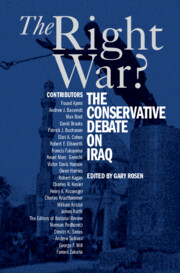Book contents
- Frontmatter
- Contents
- List of Contributors
- Introduction
- 1 Iraq's Future – and Ours
- 2 The Right War for the Right Reasons
- 3 Iraq: Losing the American Way
- 4 Intervention With a Vision
- 5 An End to Illusion
- 6 Quitters
- 7 A More Humble Hawk; Crisis of Confidence
- 8 Time for Bush to See the Realities of Iraq
- 9 Iraq May Survive, but the Dream Is Dead
- 10 The Perils of Hegemony
- 11 Like It's 1999: How We Could Have Done It Right
- 12 Reality Check – This Is War; In Modern Imperialism, U.S. Needs to Walk Softly
- 13 A Time for Reckoning: Ten Lessons to Take Away from Iraq
- 14 World War IV: How It Started, What It Means, and Why We Have to Win
- 15 The Neoconservative Moment
- 16 In Defense of Democratic Realism
- 17 ‘Stay the Course!’ Is Not Enough
- 18 Realism's Shining Morality
- 19 Has Iraq Weakened Us?
- 20 Democracy and the Bush Doctrine
- 21 A Time for Humility
- 22 Birth of a Democracy
- Index
4 - Intervention With a Vision
Published online by Cambridge University Press: 10 August 2009
- Frontmatter
- Contents
- List of Contributors
- Introduction
- 1 Iraq's Future – and Ours
- 2 The Right War for the Right Reasons
- 3 Iraq: Losing the American Way
- 4 Intervention With a Vision
- 5 An End to Illusion
- 6 Quitters
- 7 A More Humble Hawk; Crisis of Confidence
- 8 Time for Bush to See the Realities of Iraq
- 9 Iraq May Survive, but the Dream Is Dead
- 10 The Perils of Hegemony
- 11 Like It's 1999: How We Could Have Done It Right
- 12 Reality Check – This Is War; In Modern Imperialism, U.S. Needs to Walk Softly
- 13 A Time for Reckoning: Ten Lessons to Take Away from Iraq
- 14 World War IV: How It Started, What It Means, and Why We Have to Win
- 15 The Neoconservative Moment
- 16 In Defense of Democratic Realism
- 17 ‘Stay the Course!’ Is Not Enough
- 18 Realism's Shining Morality
- 19 Has Iraq Weakened Us?
- 20 Democracy and the Bush Doctrine
- 21 A Time for Humility
- 22 Birth of a Democracy
- Index
Summary
What marks this century as one of unprecedented upheaval is not primarily the emergence of new centers of power such as China or India; that has happened before, though not on this global scale. Nor is it the fact that significant states are losing control over all or part of their territory. The unique aspect is that when state power weakens, non-state terrorist groups fill the vacuum for the purpose of threatening the state system itself. The challenge is not simply to reestablish an international system but to prevent vacuums that suck into themselves the nihilistic elements trying to destroy order altogether.
At least since Woodrow Wilson, the United States has had its own def-inition of international order: the idea that wars are caused less by clashing interests than by unrepresentative domestic institutions. In the Wilsonian view, foreign policy based on national interest and state power prevails when democratic institutions have failed. Since democracies settle their disputes by reason, not by war, the spreading of democracy is, to this school of thought, America's ultimate mission, and regime change its ultimate sanction.
The belief that compatible domestic structures are the ultimate foundations of international peace is not new. It was the basis of the Holy Alliance after the Napoleonic wars. The opposite of democratic, it asserted that monarchical systems were the best guarantee of international stability because they were impervious to the fickleness of public opinion.
- Type
- Chapter
- Information
- The Right War?The Conservative Debate on Iraq, pp. 49 - 53Publisher: Cambridge University PressPrint publication year: 2005



